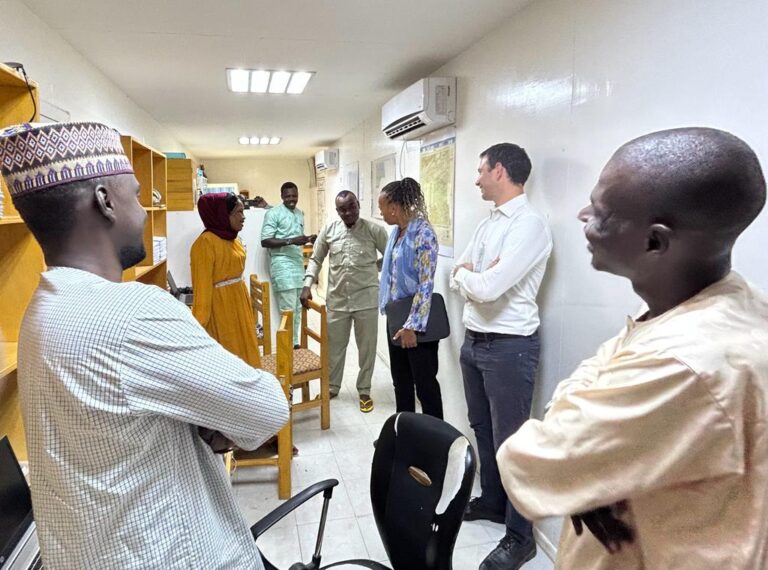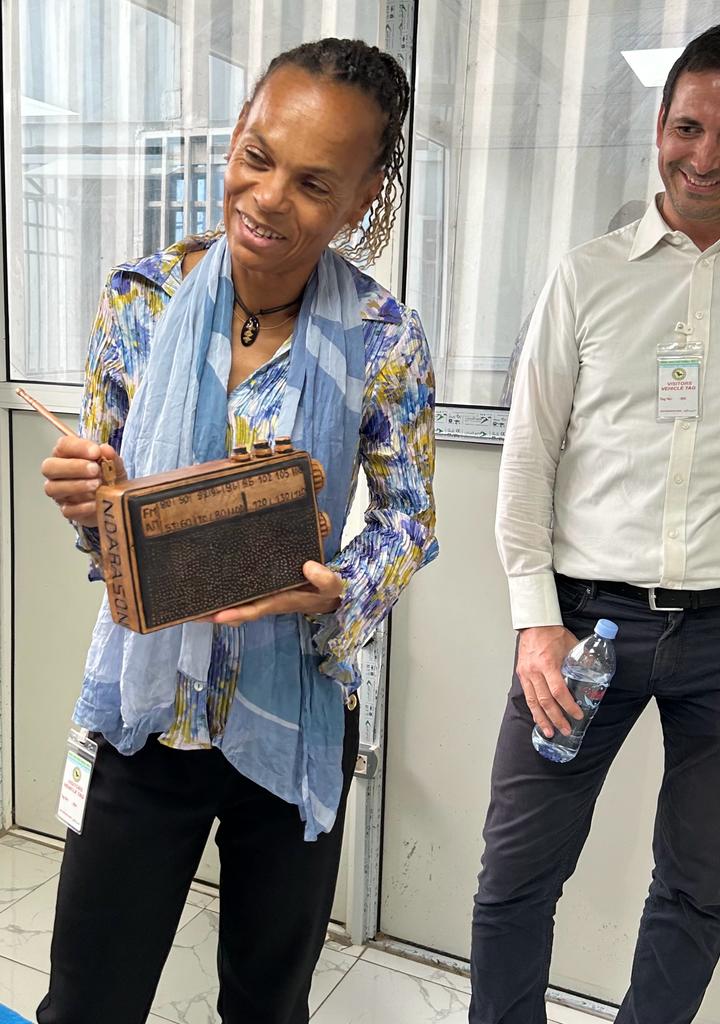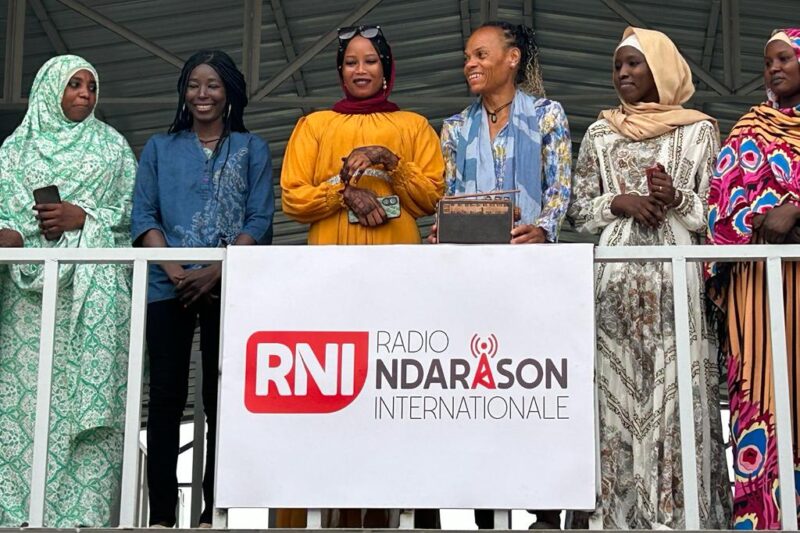The day Patricia Danzi, the director-general of the Swiss Agency for Development and Cooperation, visited Radio Ndarason will be fondly remembered
By speaking to people in their own languages, going beyond country borders, living between different populations – breeders, farmers, fishermen – knowing the sufferings, the fears and the hopes of people, these are how you contribute much to social cohesion.
So said Patricia Danzi, the director-general of the Swiss Agency for Development and Cooperation (SDC), who took time out on Friday, October 6, to visit the staff at Radio Ndarason in N’Djamena in Chad. She wanted to meet and talk to journalists at the radio station, which has had, and continues to have, a significant impact on people in the Lake Chad Basin region.
Immediately, it became obvious that Danzi exudes a certain strength.
She arrived at Radio Ndarason after a busy tour that took her to Benin, to Adré (the border between Chad and Sudan) and to N’Djamena where she was received by several high-profile authorities.
Despite her full schedule, she made a point of visiting Radio Ndarason, which counts SDC among its loyal donors. It was clear that Danzi liked being in the field – seeing, asking questions and understanding. And she has a knack for putting people at ease.

In the newsroom, as Mahamat Abakar Kafou, the editor-in-chief, began a presentation of Ndarason’s work, Danzi gently interrupted him.
“I’m familiar with the Ndarason project, but I would like to understand…” She asked direct and concrete questions on how the subjects were chosen, how the reports were done, about the translations between the different languages.
Suddenly the roles were reversed. She asked the questions and it was left to the journalists to respond. Danzi is a technocrat who never forgets the reality on the ground. And this simplicity, this spontaneous closeness, appealed to the journalists. And the meeting, which was very formal on her arrival, quickly became more relaxed.
From the newsroom she moved on to the programme department. There was a flurry of questions for the producers. She wanted to know the choice of topics covered, the daily challenges.
“I like your radio because it speaks to people in their own languages and that touches them.”
Ndarason broadcasts in Kanuri, Kanembu and Buduma, the languages spoken in the Lake Chad Basin region.
Danzi said in Switzerland there were a lot of languages, “not as many as in Chad, but we know the power of languages to bring people together around a region, around a project and I am convinced that you do it magnificently well”.
Danzi said she also liked the regional character of Ndarason. “Borders don’t stop. For many populations in Africa, the borders are the borders of their people, of their language, but you go beyond the borders.”
Ndarason works in several languages, with two editorial offices, one in N’Djamena in Chad and the other in Maiduguri in Nigeria, where an FM radio station will begin broadcasting this month. Ndarason has several correspondents in the Lac province and also in Cameroon and Niger.
Danzi said the SDC was convinced that a radio station like Ndarason played a significant role in a region that faces many challenges: violence from armed groups, displacement of populations, consequences of climate change.
“With your radio programmes on living together between different populations, breeders, farmers, fishermen, you help everyone understand one another, you contribute a lot to social cohesion.”

Danzi urged Ndarason’s female journalists to “take a closer look at women’s issues. More than half of the lake’s population is made up of women, which is important. I know it’s difficult, but we have to push them to dare.”
As an expert in development cooperation, Danzi knows very well that changing mentality is not easy work.
“It is long-term work. The SDC is aware of the challenges. The SDC does not only want to focus on the ‘emergency’ aspect, the short term for the crisis in Chad. Swiss Cooperation has been providing support to Chadians for 60 years. My eye also focuses on long-term projects, development projects. Ndarason radio is totally in line with this perspective.”
On behalf of the journalists and all the staff, Hawa Mahamat Adouma, a journalist in the Kanembu language, thanked Danzi for visiting the station, “which is a strong sign of the SDC’s support for the radio that covers the countries of the Lake Chad Basin”.
Hawa said Ndarason’s work “consists of deconstructing speeches of violence and hatred using this formidable tool that is radio”.
She said Ndarason’s journalists had a strength that no other media in the region possessed.
“We are children of this region. Most of us were born here, we speak Kanembu, Kanuri and Buduma, the languages spoken in the vast Lake Chad Basin.”
In its latest report on the state of press freedom in the Sahel, the organisation Reporters Without Borders praised the work and courage of Radio Ndarason in a difficult-to-access region.
“It’s true, it’s a difficult region to access, but not for us. Because in this Lac province, we are at home. We know the sufferings, the fears and the hopes of our people. People talk to us easily, warning us of possible dangers because they understand that we are their voices.”
Hawa said: “The road to peace is still long, but as the proverb says, ‘before being a baobab, the majestic tree is first a small seed’.”
She said that with the radio station starting to broadcast on FM in Maiduguri, this would increase Ndarason’s impact tenfold.
“Antennae will be deployed in Cameroon and Niger. Ndarason is in full development.”
She told Danzi that in Africa, when a distinguished guest visited, it was tradition to offer them a small present.

“As we broadcast on short wave, we thought we would offer you a small transistor like the one used by our many listeners in remote regions.”
She then offered Danzi a small radio carved in wood by a craftsman from the Lac province.
“So, thanks to this very sophisticated radio, from Geneva you will be able to follow our broadcasts, because Radio Ndarason means ‘the radio that follows you everywhere’.”
A delighted Danzi turned the buttons on the “radio” and everyone was burst out laughing.
It was a visit that would remain in Ndarason’s memory … and quite likely in Danzi’s too.
Nadège Hountinto









